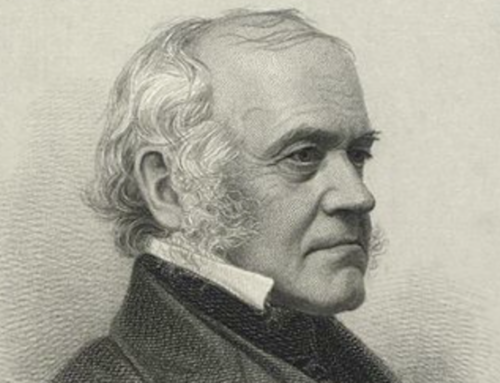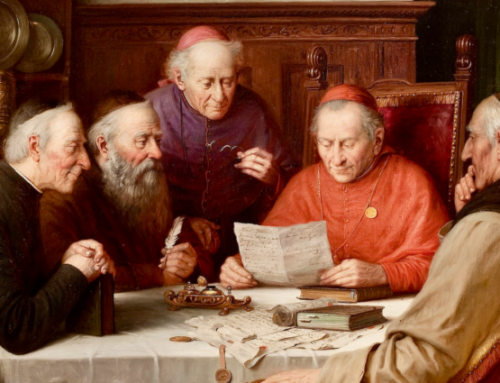 Earlier this year, Yuval Levin spoke eloquently on the centrality of gratitude in conservatism. “Conservatives,” he said, “tend to begin from gratitude for what is good … and then strive to build on it.” Surely he is on to something, and his vision of a warm conservatism is heartening. And yet if we plumb the depths of the conservative mind a little further we find another, seemingly contradictory, characteristic of conservatism: an acute experience of tragedy.
Earlier this year, Yuval Levin spoke eloquently on the centrality of gratitude in conservatism. “Conservatives,” he said, “tend to begin from gratitude for what is good … and then strive to build on it.” Surely he is on to something, and his vision of a warm conservatism is heartening. And yet if we plumb the depths of the conservative mind a little further we find another, seemingly contradictory, characteristic of conservatism: an acute experience of tragedy.
The conservative naturally eschews the folly of heady optimism, of course, and lessons about the dangers of overly ambitious social engineering or revolutionary fervor—lessons written in blood throughout the 20th century—are all too familiar.
But realism or even pessimism in politics does not quite translate into tragedy of the soul, which, I submit, is a fundamentally Christian and conservative experience.
The type of tragedy I mean is not political but intensely human. It is—rather than the tired conservative trope that man in the abstract is fallen—the personal encounter of and familiarity with such fallenness. It is a sensation close to despair, as corrosive to human happiness as it is wounding in its depth. It is not found, for instance, in the death of an elderly parent (an event which is as inevitable as it is natural), but, for example, in the slow dissolution of relationships between two kindred souls or the hard and permanent memory of an evil choice made long ago. It is not simply any given tragedy, but the awareness of the existential tragedy that lurks ominously over all our lives. Steinbeck understood this tragedy well, as it was the type faced by George Milton in Of Mice and Men or Kino and Juana in The Pearl; Mattie Ross, the heroine of Charles Portis’ classic True Grit, bore such tragedy into her old age, losing an arm as visible penance for her youthful sins. It is the terror found in Dante’s “dark wood”, the heartache of Mozart’s Requiem Mass, the spiritual alienation of St. John of the Cross, Blessed Mother Theresa, and St. Thérèse of Lisieux.
But as St. John of the Cross, at least, realized, these moments are purifying. Such tragedies inaugurate new lives in each of us, lives baptized in the truth of this world. Crucially, the Christian should not gloss over these tragic episodes. Alienation and ennui are not the exclusive property of existentialists and deconstructionists, after all; they are givens in this vale of tears. The Christian, following Christ Himself, knows such horror; and without Christ we would have little to turn to in the face of it. Of course, it is precisely in Christ that we find a reason for courage and victory over Death. But to admit that key truth is already to acknowledge the prevalence and depth of our human tragedy. Moreover, our tragedy mimics the plan of salvation history, according to which man’s relationship with God is marked by the sometimes dizzying drama of grace. I daresay, then, that those conscientious and scrupulously pious yet unimaginative and blithe believers who go about their lives with an unshakeable assurance of the goodness of this world and the people in it are missing the central spectacle of our faith. Wrestling with the darkness—grappling with the hard, dark things—is an all-important dynamic of the Christian life: in pondering evil, we choose our fate.
So far, so Christian. But this sense of tragedy also tied to conservatism. In our experience of the existential tragedy, two things happen: we are fundamentally changed (that is, we are reoriented) and we transcend ourselves. This differentiates the tragic conservative from both the progressive and the individualist.
While the progressive relentlessly pursues equality and is preoccupied with power and advantage, the tragic conservative realizes the futility of power and the ultimate absurdity of egalitarianism. The tragic conservative’s experience of tragedy is inviolably unique, and that kernel of personhood, however painful, places him outside the undifferentiated mass of the brotherhood of man. Perfect earthly equality strikes the tragic conservative as a bizarre concept likely to require political upheaval and, even if accomplished, failing to really heal the human heart in any meaningful way. He eschews the technocratic insistence on measuring worth by effectiveness or efficiency, and looks upon the gratuitous gifts in his life—whether the love he shares as a member of a particular family or community or the advantages he enjoys as an inheritor of a certain cultural patrimony—as worthwhile precisely for their fragility and occasional inefficiency. The progressive toils, claws, and fights to make things better, as soon as possible (think of President Obama’s “We Can’t Wait” initiative), but the tragic conservative yearns ultimately for another life, one completed in the fulness of salvation, and thus loses heart for the great equalizing crusades of his era.
And in contrast to the narrow individualist, hostile to any encroachment on his imagined sphere of personal autonomy, the tragic conservative spurns this sort of libertinism as its own special kind of hell. In fact, the conservative seeks out communities to join and hierarchies to submit himself to, precisely because he has stood naked before the enormity of life and admitted his own smallness.
The tragic conservative, then, informed by his encounter with the existential tragedy, rejects the temptation towards enthusiasm either for society or himself.
None of this is to suggest that we ought to dwell on the diabolical. The tragic conservative need not succumb to melancholy. Indeed, the progressive is the truly unhappy creature, for he sees life as a series of deadly serious battles and himself as the paladin of justice, weighed down by the gravity of his station. And the individualist sees all persons and events in his life swirl around him, lending undue importance to himself by his egocentrism; his experience may be pleasurable at times, but it can hardly be enjoyable. The tragic conservative alone sees himself as but an actor, or even an audience member, in the great drama of life, aware always that the plot’s resolution is thankfully out of his hands. He is able to laugh at the humor in the lines and enjoy the splendor of the costumes without taking himself too seriously.
To be sure, such a disposition need not lead to political apathy, either. The actor may not have written his lines, but he takes great care in how he delivers them. Moreover, the tragic conservative’s engagement with suffering, inasmuch as suffering is a reality of this world, affirms rather than denies the importance of social and political participation. Life is indeed worth living, even if—especially because—it is lived on the edge of a precipice of sorrow. This insight, grasped beautifully by Flannery O’Connor in many of her stories, makes evil a bellwether for meaning rather than a positive or definitive force. The tragic conservative is thus, finally, a tragicomic conservative.
The truth that the mature conservative must bear in mind always is that tragedy creates a drama in the human heart and that that drama is the stuff of life. As humans, we yearn for the True, the Good, and the Beautiful; but to do so requires some appreciation for the False, the Bad, and the Ugly. Not everyone will encounter such tragedy—too many remain safe in childlike cocoons of uncritical satisfaction. Modern liberalism encourages such ignorance, telling people that the tragedy of existence has been overcome by the Progress of History, or else that it never existed in the first place. The tragicomic conservative knows this as a lie, and he dares to live with his sadness. He is ultimately thankful for having glimpsed the void, though, for he now knows how to orient himself.
The Imaginative Conservative applies the principle of appreciation to the discussion of culture and politics—we approach dialogue with magnanimity rather than with mere civility. Will you help us remain a refreshing oasis in the increasingly contentious arena of modern discourse? Please consider donating now.







Bravo. I highly recomend you expand this into a book.
Well said! Very good. Write the book.